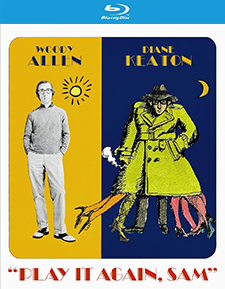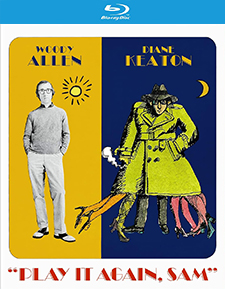Play It Again, Sam (Blu-ray Review)

Director
Herbert RossRelease Date(s)
1972 (February 11, 2025)Studio(s)
APJAC/Paramount Pictures (Kino Lorber Studio Classics)- Film/Program Grade: A-
- Video Grade: A
- Audio Grade: A
- Extras Grade: B
Review
Woody Allen starred in and adapted the 1972 film version of his 1969 play, Play It Again, Sam, but did not direct it—that job went to the underrated Herbert Ross. Though dated in some respects, it’s still very funny and clever, and rather fascinating coming as it does at an early crossroads in Allen’s career. He didn’t particularly want to go back and do the play over as a film, but saw it as an opportunity to broaden his appeal. His previous films as writer-director-star, Take the Money and Run (1969) and Bananas (1971) were low-budget and moderately successful, and he rightly figured Play It Again, Sam would appeal more to mainstream moviegoers than those earlier, somewhat chaotic works. On the other hand, the movie Allen did direct in 1972, the hit-and-mostly-miss Everything You Always Wanted to Know About Sex But Were Afraid to Ask, did just about as well; it and Play It Again, Sam ranked 15th and 16th on the year’s top-grossing films, each making around $4.7 million.
Play It Again, Sam, as it turned out, is structurally and dramatically closer to his breakthrough Annie Hall (1977) than any of Allen’s “early funny ones” even though he didn’t actually direct it. Choreographer-turned-director Ross helmed a lot of movie versions of Broadway shows, including the best of the Neil Simon films, The Sunshine Boys (1974), but also original works like the outstanding The Last of Sheila (1973). One wonders if Allen wasn’t carefully watching Ross’s methodology; in retrospect, his direction is virtually indistinguishable from Allen’s personal style, and it’s no surprise that many wrongly assume Allen himself directed it.
Diane Keaton, the late Tony Roberts, and Jerry Lacy, all in the 1969 play with Allen, reprise their roles for the film. Allen plays Allan Felix, a movie buff obsessed particularly with Humphrey Bogart, the epitome of cool when it comes to women. The film opens with Allan watching the airstrip climax to Casablanca, his mouth agape in awe.
Recently divorced from Nancy (Susan Anspach), Allan is desperately lonely, so close friends Dick (Roberts), a workaholic businessman in real estate, and his wife, Linda (Keaton), try setting him up with various women they know, and she particularly consoles him when these blind dates invariably end disastrously. Allan also frequently confers with Humphrey Bogart (Lacy) himself, a figment of Allan’s imagination. Bogie’s advice consists of amusing regurgitations of lines from his hard-boiled movies, filtered through Allan’s exaggerated image of Bogie, and don’t help much. It’s quickly apparent to the movie audience but not Allan and Linda that they have a lot in common, a match made in heaven were it not for the fact that she’s already married to Dick.
I hadn’t seen the film in decades but one of my favorite movie-going memories is a 1970s double-bill screening of Casablanca and Play It Again, Sam at Ann Arbor’s Michigan Theater. How great is that? After Casablanca, the second feature begins with the end of the movie we all just watched, itself a kind of tribute to Bogie’s career that features a dead-on recreation of the previous movie at its conclusion. Why don’t more revival theaters book them together?
The film has dated in amusing and sometimes peculiar ways. A conversation between Allan and Linda about rape fantasy is as cringe-inducing today as watching Al Jolson Goin’ to Heaven on a Mule, though that’s a momentary lapse. Allan’s apartment overflows with posters and lobby cards from Bogie’s classic and lesser films (e.g., Sirocco), all of which Allan could have in 1972 purchased for around five or six-hundred bucks. Today all that movie paper would fetch hundreds of thousands of dollars. A hilarious running gag has forever-busy Dick constantly calling his answering service, giving telephone numbers of where he’s at and where he’ll be. Over the course of the film’s 87 minutes, Tony Roberts probably lists 30 different phone numbers. But would kids today even understand what he’s doing? I wonder.
Roberts’s death barely a week ago made watching the film a bittersweet experience. Appearing in six Woody Allen films in all, he was the perfect counterpart to Allen—tall, impeccably if conservatively dressed, as fluid in his speech and unconcerned with life’s Big Questions as Allen was halting and neurotic. Roberts was also a fine actor, something Allen never really claimed to be, and his more serious side to Dick—an understated panic after rightly guessing Linda has been unfaithful—buttresses the narrative with an emotional authenticity when it really needs it. And also I think that’s exactly the kind of moment that Herbert Ross did so well in film after film, and which maybe Allen took with him as his screenplays grew more ambitious.
Allen during this time patterned his movie characters after Bob Hope at his peak in the ‘40s—SCTV did a hilarious, knowing parody called “Play It Again, Bob,” with Hope replacing Bogart—watching this, is easy to forget what an outstanding physical comedian Allen was, though he moved away from physical comedy even before the decade was out. The film’s first blind date, with Jennifer Salt as Sharon, has her first meeting Allan at his apartment, and Allen’s physical comedy is so hilarious it’s clear Keaton, Salt, and Roberts (especially) are struggling not to burst out laughing at Allen.
Like Roberts, Keaton is terrific with Allen, still the best of his leading ladies, and the film is full of funny lines:
“What are you doing Saturday night?” “Committing suicide.” “What about Friday night?”
Bogie: “I’ve had my face slapped [by women] plenty of times.” Allan: “Yeah, but your glasses don’t go flying across the room.”
Kino’s Blu-ray of Play It Again, Sam is derived from a new 4K scan of the original camera negative. The 1.85:1 presentation looks great, far superior to all previous home video versions, with accurate color and impressive sharpness. The DTS-HD Master Audio (2.0 mono) is strong, and optional English subtitles are provided on this Region “A” disc.
Extras are limited to an above-average audio commentary by screenwriter-producer Alan Spencer (Sledge Hammer!) and film historian Justin Humphreys. Is this the first/only movie starring Woody Allen to have a commentary track? (Unlike the majority of his best films, released by United Artists and, later Orion, and controlled by MGM, this originally was a Paramount release.) Also included is a rather pitiful-looking trailer, an nth-generation copy presented 4:3 full-frame.
Still very funny all these decades later, Play It Again, Sam is highly recommended.
- Stuart Galbraith IV

